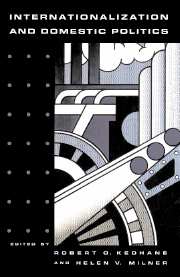Book contents
- Frontmatter
- Contents
- Preface
- Contributors
- PART I Theoretical Framework
- PART II The Industrialized Democracies
- PART III Internationalization and Socialism
- 7 Stalin's Revenge: Institutional Barriers to Internationalization in the Soviet Union
- 8 Internationalization and China's Economic Reforms
- PART IV International Economic Crisis and Developing Countries
- PART V Conclusion
- Notes
- References
- Index
8 - Internationalization and China's Economic Reforms
Published online by Cambridge University Press: 20 March 2010
- Frontmatter
- Contents
- Preface
- Contributors
- PART I Theoretical Framework
- PART II The Industrialized Democracies
- PART III Internationalization and Socialism
- 7 Stalin's Revenge: Institutional Barriers to Internationalization in the Soviet Union
- 8 Internationalization and China's Economic Reforms
- PART IV International Economic Crisis and Developing Countries
- PART V Conclusion
- Notes
- References
- Index
Summary
Foreign trade and investment policies have made a very significant contribution to the success of China's economic reform drive begun in December 1978. The momentous decision of Chinese Communist Party (CCP) leaders to abandon autarky and open up to the world economy came early in the reform drive, in 1979. The so-called opening policies, that is, to welcome foreign investment and expand and decentralize foreign trade, were not only extraordinarily successful in economic terms, thereby stimulating the growth of the domestic economy, but also evoked crucial political support for the reform drive from key sectors and regions and thereby helped sustain it despite serious obstacles for a decade and a half.
The question addressed in this paper is what role, if any, did the internationalization of the world economy over the past four decades have on Chinese foreign economic policies in the pre-reform era, on the initiation of reforms, and on the economic and political success of reforms.
Chapter 7 on the Soviet Union, by Matthew Evangelista, suggests that Leninist regimes are a “tough case” for demonstrating the impact of internationalization on domestic policy outcomes because the thick institutions of the Communist Party state prevent information about the international economy from reaching domestic actors. As a result of this self-isolation, the coalition of groups that gain most from protection against international competition, that is, capital intensive heavy industries, inland provinces, and Communist Party and military control organizations, are able to maintain themselves in power.
- Type
- Chapter
- Information
- Internationalization and Domestic Politics , pp. 186 - 206Publisher: Cambridge University PressPrint publication year: 1996
- 14
- Cited by

